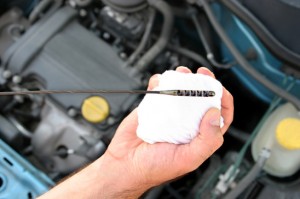Motor oil is one of the necessary common maintenance items of owning a car.
You wouldn’t imagine your car operating without regularly pulling into the gas station. The same applies to motor oil.
It’s something every driver understands on some level.
But how often should you change your motor oil? That question is heavily debated online.
Should you schedule it every 3,000 miles? Can you wait 5,000? New advice states you can even wait 10,000 miles or more with some cars. Is that true?
Cars today are staying in service longer than ever before … 12 years on average. But a car won’t stay running and be a reliable asset in your life if you don’t care for it.
Yes, cars are more sophisticated than ever before. Yet no matter how much technology influences how a car operates, if it’s an internal combustion engine, motor oil will always be the lifeblood.
What motor oil does for a car
Motor oil serves a vital role in keeping your car’s engine running smoothly and efficiently. One of its main jobs is to reduce friction between the many moving parts inside the engine, like pistons and crankshafts, helping to prevent premature wear and damage. As the engine runs, it generates a lot of heat. Motor oil helps dissipate this heat, keeping the engine at a safe operating temperature.
But that’s not all; motor oil also acts as a cleaner. Over time, dirt and debris can build up in the engine, potentially causing harm. Motor oil contains special additives that trap and suspend these contaminants, pushing them through the oil filter to remove them. This helps keep the engine clean and running smoothly.
Motor oil creates a seal in the engine, which is crucial for maintaining compression in the cylinders and ensuring efficient combustion. It also protects engine components from corrosion, reducing the risk of rust and deterioration. Plus, it plays a role in reducing engine noise and vibrations, contributing to a quieter and more comfortable ride.
Did you know your motor oil did all that? Now imagine your engine if the motor oil isn’t doing its job.
What if you don’t change the motor oil?
We all know motor oil is important to keep a car operational. Still, it sometimes sinks to the bottom of your to-do list. You keep pushing it aside with more important things to do.
Here’s why you shouldn’t.
Over time, that oil gets dirty and gunky, filled with all sorts of debris and contaminants from your engine. This contaminated oil can’t do its job properly to keep things running smoothly. Without adequate lubrication, your engine’s moving parts start to rub against each other, causing wear and tear. That means your engine might not last as long as it should, and you could be facing some hefty repair bills.
Your car’s performance takes a hit, too. You might notice it feels weaker, slower to respond, and drinks more gas. That’s because the engine has to work harder without sufficient oil. Plus, there’s the risk of your engine overheating, which can lead to serious problems like warped parts and engine damage.
This can all impact your wallet. Poor engine performance and efficiency mean you’re burning more fuel for the same distance traveled, costing you extra at the pump. On top of that, a poorly maintained engine can throw out more harmful emissions, which are not great for the environment and may even make your car fail emissions tests.
Worst-case scenario? Your engine might give up on you altogether. Yep, that’s a pricey situation to fix. So, don’t skip those regular oil changes. It’s a simple and cost-effective way to keep your car running smoothly, save money in the long run, and avoid a lot of headaches.
Convinced? Here’s how often you should change your motor oil
Changing your motor oil is based on mileage. It’s also based on timing. Here’s why.
Let’s say you work from home, and your car sits in the garage most days. You take it out occasionally – a trip to the grocery store 3 miles away, a night out at a restaurant 5 miles from your house.
To hit 3,000 miles at that rate may take you nine months or more. In this circumstance, it’s better to err on the side of caution and replace it at least twice per year. Short trips aren’t enough to heat your engine rough to boil off condensation accumulating within the system. This can cause motor oil to break down faster.
Let’s talk about the age of your car. If you’ve purchased it in the last few months, start by looking at the owner’s manual for guidance. Many manufacturers suggest 5,000, 7,500, or even 10,000 miles or more between motor oil changes. Again, you should take your driving style and habits into account.
A new car driven regularly at fairly steady speeds creates the perfect scenario for going a little longer between oil changes. An older car that is driven erratically in stop-and-go traffic provides a reason to change it more frequently to ensure the motor oil remains in good working condition.
What about synthetic motor oil?
When your car was designed, it was with a specific motor oil in mind. You’ll find the weight of motor oil needed printed on the cap where you add the oil. It’s listed in your owner’s manual, too. The manufacturer knows best; going with what’s recommended or required assures you use the right motor oil for the way your vehicle was designed. It can also save you money and avoid using motor oil that may not be best for your car’s engine.
That said, older cars may work better by upgrading motor oil. Synthetic oil is designed to be more effective at resisting breakdown and withstanding higher temperatures. It’s also designed to last longer, meaning 10,000 miles or more may be possible.
Yes, there isn’t always a clear road to deciding what motor oil is best. That’s where finding a trusted auto mechanic can help you navigate oil changes more effectively.
If a service only offers oil changes, they are more likely to push everything they can to up the sale – more expensive motor oil, upgraded filters, and more frequent servicing.
When you work with a mechanic there to keep your car running smoothly, you’ll get honest advice about what best suits your vehicle and how you drive.
If you haven’t worked with us before, you’re in for a surprise. We’re a family-owned and operated business that still thrives on offering sound advice.
Is that what you need to keep your car running smoothly?


 That makes motor oil pretty important, right?
That makes motor oil pretty important, right?